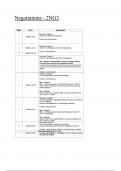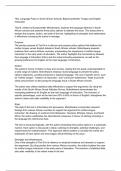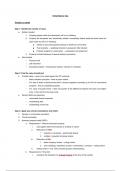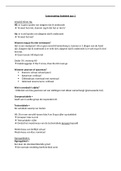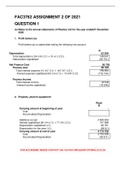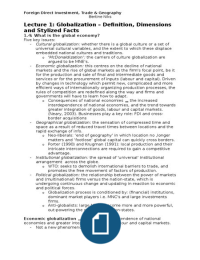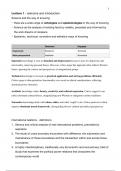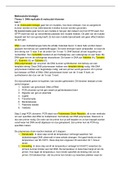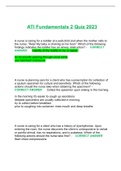Operations management
Inhoud
Hoofdstuk 1: Introductie Supply Chain & Operations Management......................................................4
Supply Chain Management (SCM)......................................................................................................4
Materialen......................................................................................................................................4
Supply chain management.............................................................................................................4
SC Operations Reference Model (SCOR).............................................................................................5
Reliability & responsiveness...........................................................................................................6
Operational cost, Asset efficiency & Flexibility...............................................................................6
Samenvatting: SC perfomantie attributen......................................................................................6
Oefening: source – make – deliver.................................................................................................6
Operations Management (OM)..........................................................................................................7
Producten versus diensten.................................................................................................................7
OM vs. Productiebeheer.................................................................................................................7
Operations Research (OR)..................................................................................................................8
Hoofdstuk 2: Basisconcepten Operations Management........................................................................8
OM bedrijfsprocessen........................................................................................................................8
OM: management system..............................................................................................................8
OM: Interne afdelingen en externe partners..................................................................................9
Functies in Operations & SC mgmt.................................................................................................9
OM beschermingsmechanismen........................................................................................................9
Productieomgevingen MTS / MTO / ATO / ETO................................................................................10
Productiedoorlooptijd P versus leveringstermijn D......................................................................10
P en D: MakeToStock (MTS)..........................................................................................................10
P en D: MakeToOrder (MTO)........................................................................................................10
P en D: AssembleToOrder (ATO)...................................................................................................10
P en D: EngineerToOrder(ETO).....................................................................................................11
Overzicht productieomgevingen...................................................................................................11
Belang van het klantenorder-ontkoppelpunt...................................................................................11
Uitgestelde differentiatie..............................................................................................................11
OM: Informatiestroom en KOOP..................................................................................................11
OM: Strategische keuzes..............................................................................................................12
OM: Productieomgevingen in functie van bedrijfsstrategie (2)........................................................12
Doorlooptijden, wachttijden en WIP................................................................................................12
1
,Hoofdstuk 3: Basisconcepten voorraadbeheer.....................................................................................12
Definitie en doel van voorraad.........................................................................................................12
Definities.......................................................................................................................................12
Factoren die bijdragen tot voorraad.............................................................................................13
Het doel van voorraad..................................................................................................................13
Het economisch aspect van voorraad...............................................................................................13
Trends in voorraadbeheer............................................................................................................13
Voorraadsysteem.............................................................................................................................14
Definitie........................................................................................................................................14
Voorraadsysteem: 5 componenten..............................................................................................14
Voorraadbewaarkosten....................................................................................................................15
Definities van klantenservice............................................................................................................15
5 types klantenservice (EXAMEN).................................................................................................15
Meten van voorraad.........................................................................................................................16
Voorraadinvestering.....................................................................................................................16
Voorraadrotatie (Inventory turnover ratio)..................................................................................17
Aantal weken voorraad (Weeks of supply)...................................................................................17
ABC product classificatie...................................................................................................................17
Hoofdstuk 4. herbevoorradingsmodellen.............................................................................................18
Introductie........................................................................................................................................18
Het deterministisch herbevoorradingsmodel bij aankoop...............................................................18
Aannames.....................................................................................................................................18
ROP...............................................................................................................................................18
Voorraad.......................................................................................................................................19
EOQ...............................................................................................................................................19
Economic Order Quantity (EOQ).......................................................................................................19
Afgeleide resultaten.....................................................................................................................19
Bedenkingen.................................................................................................................................19
Besluit...........................................................................................................................................19
Centralisatie van voorraden op basis van EOQ.................................................................................20
Stochastische herbevoorradingsmodellen........................................................................................20
Toevoegen van onzekerheid.........................................................................................................20
Veiligheidsvoorraad of Safety Stock SS.............................................................................................20
Continuous versus periodic Review Policy........................................................................................21
Continuous Replenishment: (Q,R) policy......................................................................................21
Periodic Replenishment: (s, S) Policy............................................................................................21
2
, Overzicht (examen).......................................................................................................................22
Hoofdstuk 5: Productieprocessen & BoM.............................................................................................22
Introductie........................................................................................................................................22
Productieproces & Operaties............................................................................................................22
Indeling productieprocessen........................................................................................................22
Operaties van een productieproces..............................................................................................23
Bill of Material..................................................................................................................................23
Productieproces: specifieke kenmerken...........................................................................................23
Resources.........................................................................................................................................25
Hoofdstuk 6: Materiaalplanning (MRP) & Hoofdproductieplanning (MPS)..........................................25
Afhankelijke versus onafhankelijke vraag.........................................................................................25
MRP schema.....................................................................................................................................25
MRP explosie....................................................................................................................................26
MRP Pegging.....................................................................................................................................27
MRP rolling horizon en orderuitgifte................................................................................................27
MPS schema.....................................................................................................................................28
MPS en FAS.......................................................................................................................................29
Planning Bills & Lotsizing technieken................................................................................................30
Hoofdstuk 7. ATP en capaciteitsplanning.............................................................................................31
ATP (available to promise) concept..................................................................................................31
MPS..............................................................................................................................................31
MRP..............................................................................................................................................32
Order promising mechanisme......................................................................................................32
Capaciteitsplanning (MPS/MRP).......................................................................................................33
Resources.....................................................................................................................................33
RCCP.............................................................................................................................................34
(Detailed) Capacity Requirement planning (CRP).........................................................................36
Overzicht capaciteitsplanning.......................................................................................................37
Scheduling....................................................................................................................................37
Hoofdstuk 8. Lean manufacturing........................................................................................................38
Automotive industrie van 1903 tem 1955........................................................................................38
TPS: van JIT naar Lean manufacturing..............................................................................................40
De 7 vormen van Waste: Muda = waste = verspilling.......................................................................41
JIT productietechnieken: Heijunka en Kanban..................................................................................42
Autonomation: Jidoka......................................................................................................................45
Productie lay-out..............................................................................................................................45
3
, Hoofdstuk 9. Theory of constraints (TOC)............................................................................................45
TOC...................................................................................................................................................45
De “troop” analogie......................................................................................................................46
Theory of constraints....................................................................................................................46
TOC en DBR gevallenstudie..............................................................................................................47
Hoofdstuk 1: Introductie Supply Chain & Operations
Management
Supply Chain Management (SCM)
De Supply Chain = keten van processen die nodig zijn om ruwe materialen naar eindproducten te
transformeren en deze eindproducten tot bij de klant/markt/gebruiker te brengen
Integrale goederenstroom, integrale logistieke keten
Ruwe materialen & componenten eindproduct verpakkingseenheden, distributie en
verkoop
B2B = Business-to-Business, B2C = Business-to-Consumer C2C = Consumer-to-Consumer, G2C
= Government-to-Consumer
Het Supply Chain netwerk bestaat uit:
- Leveranciers (suppliers)
- Productiecentra (manufacturing centers)
- Magazijnen (warehouses): vlakbij de fabriek
• Magazijn: meerdere producten, uitbreidbaar met rekken & mezzanine
• Tank en silo: 1 product tegelijkertijd, niet uitbreidbaar tenzij met dure investering
- Distributiecentra (distribution centers): logistiek en klanten beheren
• Regionaal of lokaal georganiseerd
• Enkel transportknooppunt, of met productiefaciliteiten voor e-fulfilment,
bulk/verpakt, maatwerk (customisation)
- Verkooppunten (point of sales)
• Groothandel (wholesale)
• Detailhandel (retail): vb. supermarkt
• Directe verkoop (direct sales)
Materialen
Grondstoffen (raw materials)
Half afgewerkte producten (intermediate products, semi-finished products, components,
subassemblies): vb. Dingen die rondslingeren in transport
Eindproducten (finished products)
MRO-artikelen: Onderhoudsmateriaal (Maintenance supplies), Reserveonderdelen (Repair supplies,
deze vraag is meestal onvoorspelbaar én dringend, kan het productieproces verstoren),
Gereedschappen (Operating supplies)
Supply chain management
Heeft betrekking op de design, ontwikkeling, optimalisatie en het management van de interne en
externe componenten van de SC (hoe gaan we werken)
Overkoepelt (wereldwijd): aanleveren van materialen, transformatie van het materiaal, distributie
van eindproducten (of diensten) tot aan de klanten
En dit consistent met de algemene objectieven en strategieën van het bedrijf [Spekman, 1998]
- SC Objectieven: Reliability: betrouwbaarheid bij het opleveren, Responsiveness: snelheid
waarmee aan de vraag van klant wordt voldaan, Cost: operationele kost vooraleer producten
te verkopen (Cost Of Goods Sold), Asset efficiency: optimaal gebruik van assets (geld,
resources), Flexibility: wendbaarheid om de SC aan te passen aan andere vraagvolumes
4
Inhoud
Hoofdstuk 1: Introductie Supply Chain & Operations Management......................................................4
Supply Chain Management (SCM)......................................................................................................4
Materialen......................................................................................................................................4
Supply chain management.............................................................................................................4
SC Operations Reference Model (SCOR).............................................................................................5
Reliability & responsiveness...........................................................................................................6
Operational cost, Asset efficiency & Flexibility...............................................................................6
Samenvatting: SC perfomantie attributen......................................................................................6
Oefening: source – make – deliver.................................................................................................6
Operations Management (OM)..........................................................................................................7
Producten versus diensten.................................................................................................................7
OM vs. Productiebeheer.................................................................................................................7
Operations Research (OR)..................................................................................................................8
Hoofdstuk 2: Basisconcepten Operations Management........................................................................8
OM bedrijfsprocessen........................................................................................................................8
OM: management system..............................................................................................................8
OM: Interne afdelingen en externe partners..................................................................................9
Functies in Operations & SC mgmt.................................................................................................9
OM beschermingsmechanismen........................................................................................................9
Productieomgevingen MTS / MTO / ATO / ETO................................................................................10
Productiedoorlooptijd P versus leveringstermijn D......................................................................10
P en D: MakeToStock (MTS)..........................................................................................................10
P en D: MakeToOrder (MTO)........................................................................................................10
P en D: AssembleToOrder (ATO)...................................................................................................10
P en D: EngineerToOrder(ETO).....................................................................................................11
Overzicht productieomgevingen...................................................................................................11
Belang van het klantenorder-ontkoppelpunt...................................................................................11
Uitgestelde differentiatie..............................................................................................................11
OM: Informatiestroom en KOOP..................................................................................................11
OM: Strategische keuzes..............................................................................................................12
OM: Productieomgevingen in functie van bedrijfsstrategie (2)........................................................12
Doorlooptijden, wachttijden en WIP................................................................................................12
1
,Hoofdstuk 3: Basisconcepten voorraadbeheer.....................................................................................12
Definitie en doel van voorraad.........................................................................................................12
Definities.......................................................................................................................................12
Factoren die bijdragen tot voorraad.............................................................................................13
Het doel van voorraad..................................................................................................................13
Het economisch aspect van voorraad...............................................................................................13
Trends in voorraadbeheer............................................................................................................13
Voorraadsysteem.............................................................................................................................14
Definitie........................................................................................................................................14
Voorraadsysteem: 5 componenten..............................................................................................14
Voorraadbewaarkosten....................................................................................................................15
Definities van klantenservice............................................................................................................15
5 types klantenservice (EXAMEN).................................................................................................15
Meten van voorraad.........................................................................................................................16
Voorraadinvestering.....................................................................................................................16
Voorraadrotatie (Inventory turnover ratio)..................................................................................17
Aantal weken voorraad (Weeks of supply)...................................................................................17
ABC product classificatie...................................................................................................................17
Hoofdstuk 4. herbevoorradingsmodellen.............................................................................................18
Introductie........................................................................................................................................18
Het deterministisch herbevoorradingsmodel bij aankoop...............................................................18
Aannames.....................................................................................................................................18
ROP...............................................................................................................................................18
Voorraad.......................................................................................................................................19
EOQ...............................................................................................................................................19
Economic Order Quantity (EOQ).......................................................................................................19
Afgeleide resultaten.....................................................................................................................19
Bedenkingen.................................................................................................................................19
Besluit...........................................................................................................................................19
Centralisatie van voorraden op basis van EOQ.................................................................................20
Stochastische herbevoorradingsmodellen........................................................................................20
Toevoegen van onzekerheid.........................................................................................................20
Veiligheidsvoorraad of Safety Stock SS.............................................................................................20
Continuous versus periodic Review Policy........................................................................................21
Continuous Replenishment: (Q,R) policy......................................................................................21
Periodic Replenishment: (s, S) Policy............................................................................................21
2
, Overzicht (examen).......................................................................................................................22
Hoofdstuk 5: Productieprocessen & BoM.............................................................................................22
Introductie........................................................................................................................................22
Productieproces & Operaties............................................................................................................22
Indeling productieprocessen........................................................................................................22
Operaties van een productieproces..............................................................................................23
Bill of Material..................................................................................................................................23
Productieproces: specifieke kenmerken...........................................................................................23
Resources.........................................................................................................................................25
Hoofdstuk 6: Materiaalplanning (MRP) & Hoofdproductieplanning (MPS)..........................................25
Afhankelijke versus onafhankelijke vraag.........................................................................................25
MRP schema.....................................................................................................................................25
MRP explosie....................................................................................................................................26
MRP Pegging.....................................................................................................................................27
MRP rolling horizon en orderuitgifte................................................................................................27
MPS schema.....................................................................................................................................28
MPS en FAS.......................................................................................................................................29
Planning Bills & Lotsizing technieken................................................................................................30
Hoofdstuk 7. ATP en capaciteitsplanning.............................................................................................31
ATP (available to promise) concept..................................................................................................31
MPS..............................................................................................................................................31
MRP..............................................................................................................................................32
Order promising mechanisme......................................................................................................32
Capaciteitsplanning (MPS/MRP).......................................................................................................33
Resources.....................................................................................................................................33
RCCP.............................................................................................................................................34
(Detailed) Capacity Requirement planning (CRP).........................................................................36
Overzicht capaciteitsplanning.......................................................................................................37
Scheduling....................................................................................................................................37
Hoofdstuk 8. Lean manufacturing........................................................................................................38
Automotive industrie van 1903 tem 1955........................................................................................38
TPS: van JIT naar Lean manufacturing..............................................................................................40
De 7 vormen van Waste: Muda = waste = verspilling.......................................................................41
JIT productietechnieken: Heijunka en Kanban..................................................................................42
Autonomation: Jidoka......................................................................................................................45
Productie lay-out..............................................................................................................................45
3
, Hoofdstuk 9. Theory of constraints (TOC)............................................................................................45
TOC...................................................................................................................................................45
De “troop” analogie......................................................................................................................46
Theory of constraints....................................................................................................................46
TOC en DBR gevallenstudie..............................................................................................................47
Hoofdstuk 1: Introductie Supply Chain & Operations
Management
Supply Chain Management (SCM)
De Supply Chain = keten van processen die nodig zijn om ruwe materialen naar eindproducten te
transformeren en deze eindproducten tot bij de klant/markt/gebruiker te brengen
Integrale goederenstroom, integrale logistieke keten
Ruwe materialen & componenten eindproduct verpakkingseenheden, distributie en
verkoop
B2B = Business-to-Business, B2C = Business-to-Consumer C2C = Consumer-to-Consumer, G2C
= Government-to-Consumer
Het Supply Chain netwerk bestaat uit:
- Leveranciers (suppliers)
- Productiecentra (manufacturing centers)
- Magazijnen (warehouses): vlakbij de fabriek
• Magazijn: meerdere producten, uitbreidbaar met rekken & mezzanine
• Tank en silo: 1 product tegelijkertijd, niet uitbreidbaar tenzij met dure investering
- Distributiecentra (distribution centers): logistiek en klanten beheren
• Regionaal of lokaal georganiseerd
• Enkel transportknooppunt, of met productiefaciliteiten voor e-fulfilment,
bulk/verpakt, maatwerk (customisation)
- Verkooppunten (point of sales)
• Groothandel (wholesale)
• Detailhandel (retail): vb. supermarkt
• Directe verkoop (direct sales)
Materialen
Grondstoffen (raw materials)
Half afgewerkte producten (intermediate products, semi-finished products, components,
subassemblies): vb. Dingen die rondslingeren in transport
Eindproducten (finished products)
MRO-artikelen: Onderhoudsmateriaal (Maintenance supplies), Reserveonderdelen (Repair supplies,
deze vraag is meestal onvoorspelbaar én dringend, kan het productieproces verstoren),
Gereedschappen (Operating supplies)
Supply chain management
Heeft betrekking op de design, ontwikkeling, optimalisatie en het management van de interne en
externe componenten van de SC (hoe gaan we werken)
Overkoepelt (wereldwijd): aanleveren van materialen, transformatie van het materiaal, distributie
van eindproducten (of diensten) tot aan de klanten
En dit consistent met de algemene objectieven en strategieën van het bedrijf [Spekman, 1998]
- SC Objectieven: Reliability: betrouwbaarheid bij het opleveren, Responsiveness: snelheid
waarmee aan de vraag van klant wordt voldaan, Cost: operationele kost vooraleer producten
te verkopen (Cost Of Goods Sold), Asset efficiency: optimaal gebruik van assets (geld,
resources), Flexibility: wendbaarheid om de SC aan te passen aan andere vraagvolumes
4

